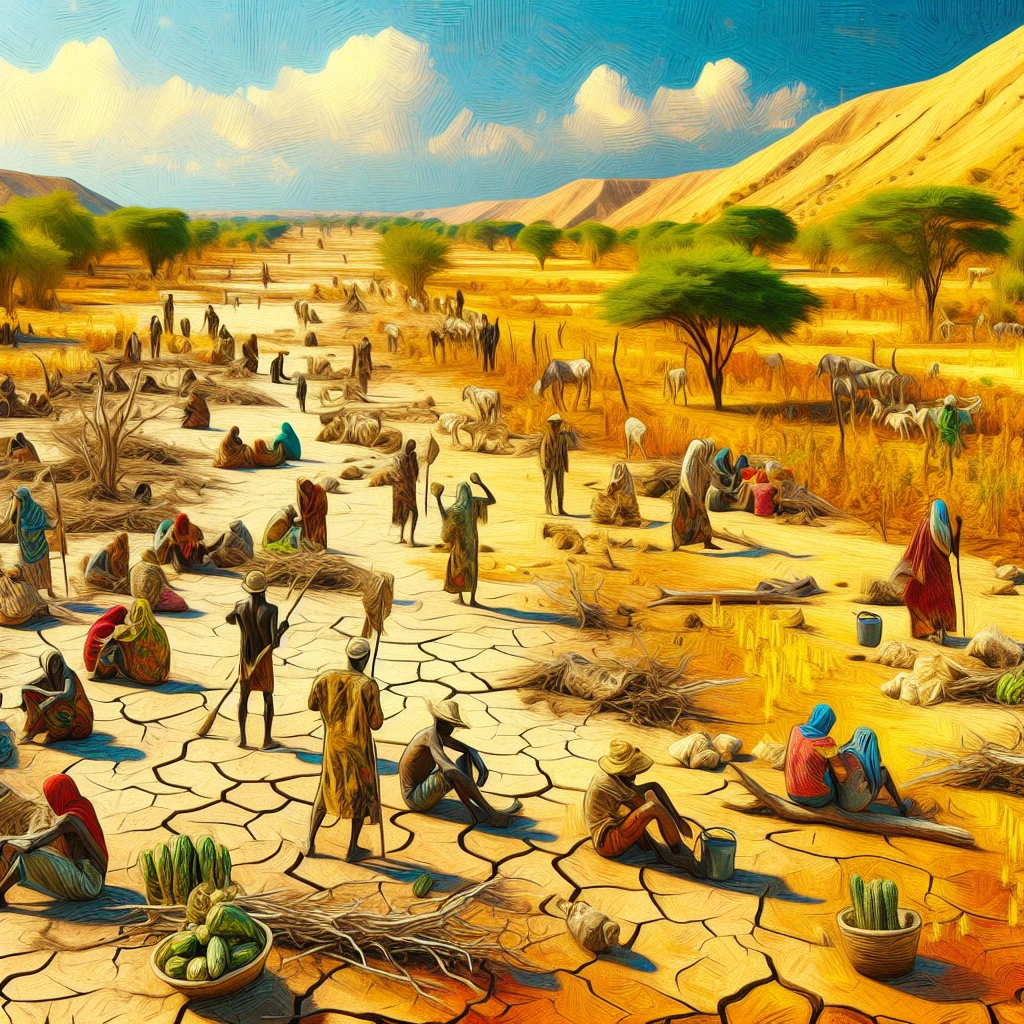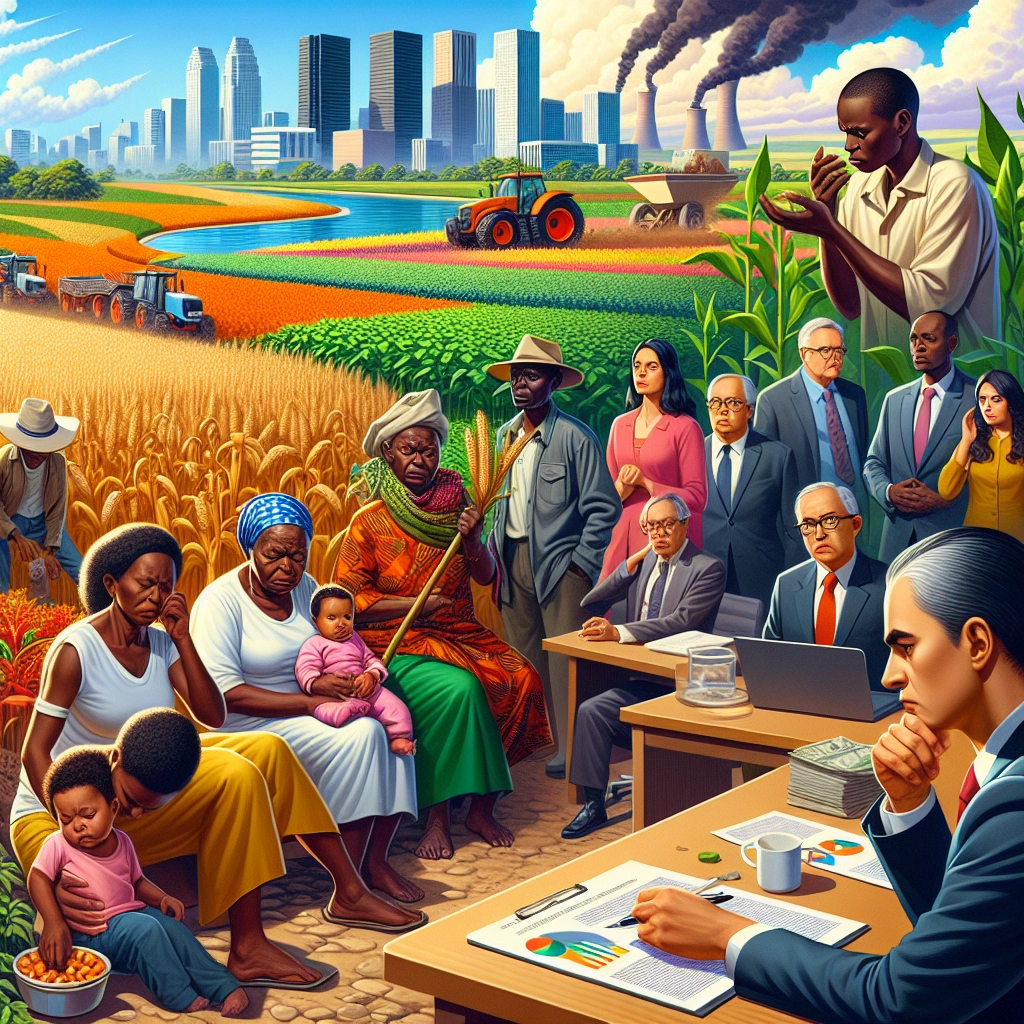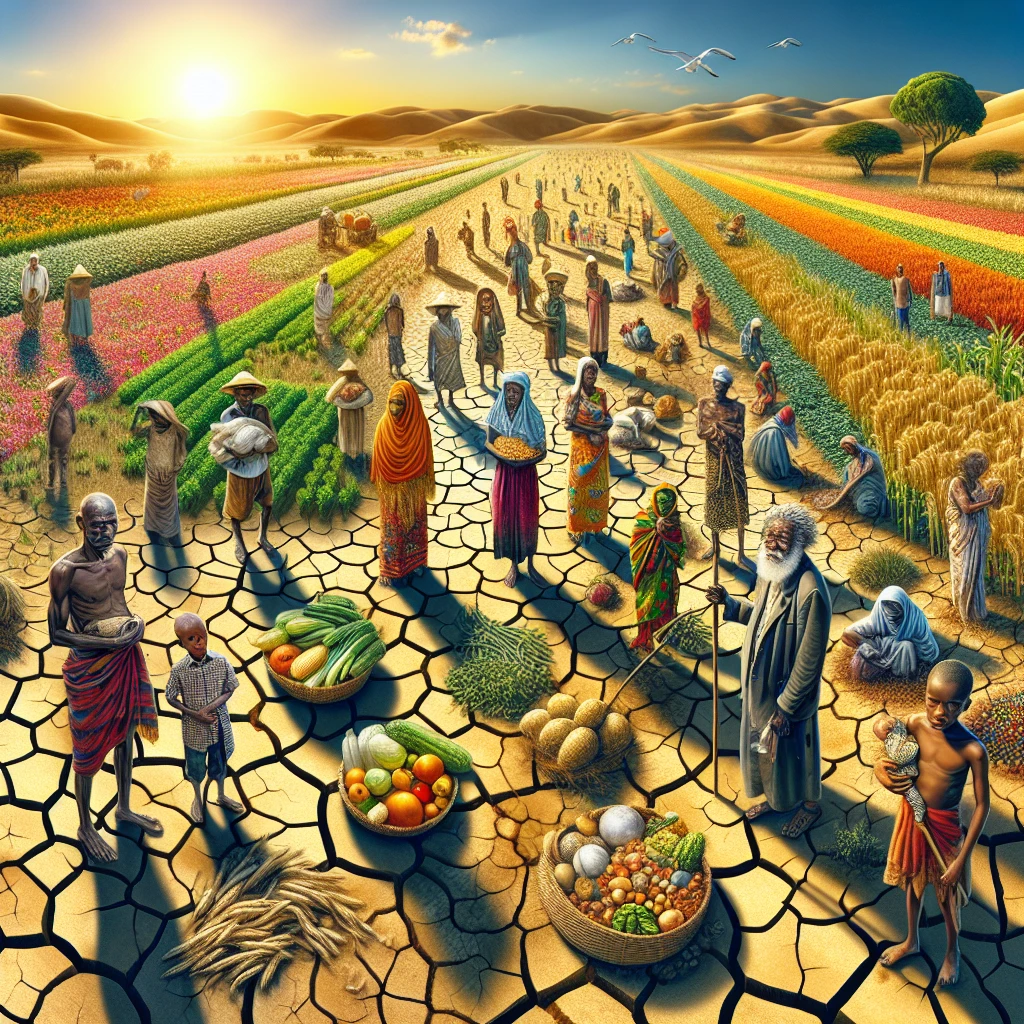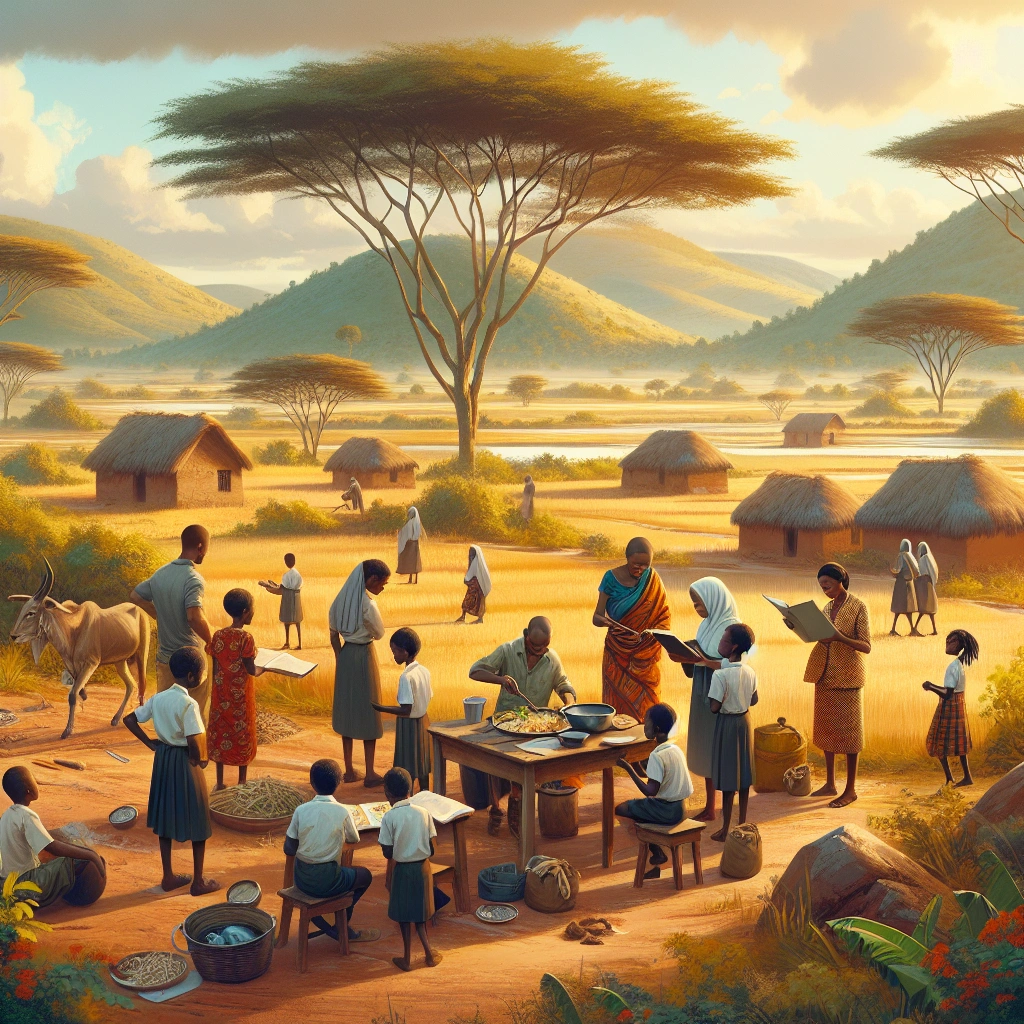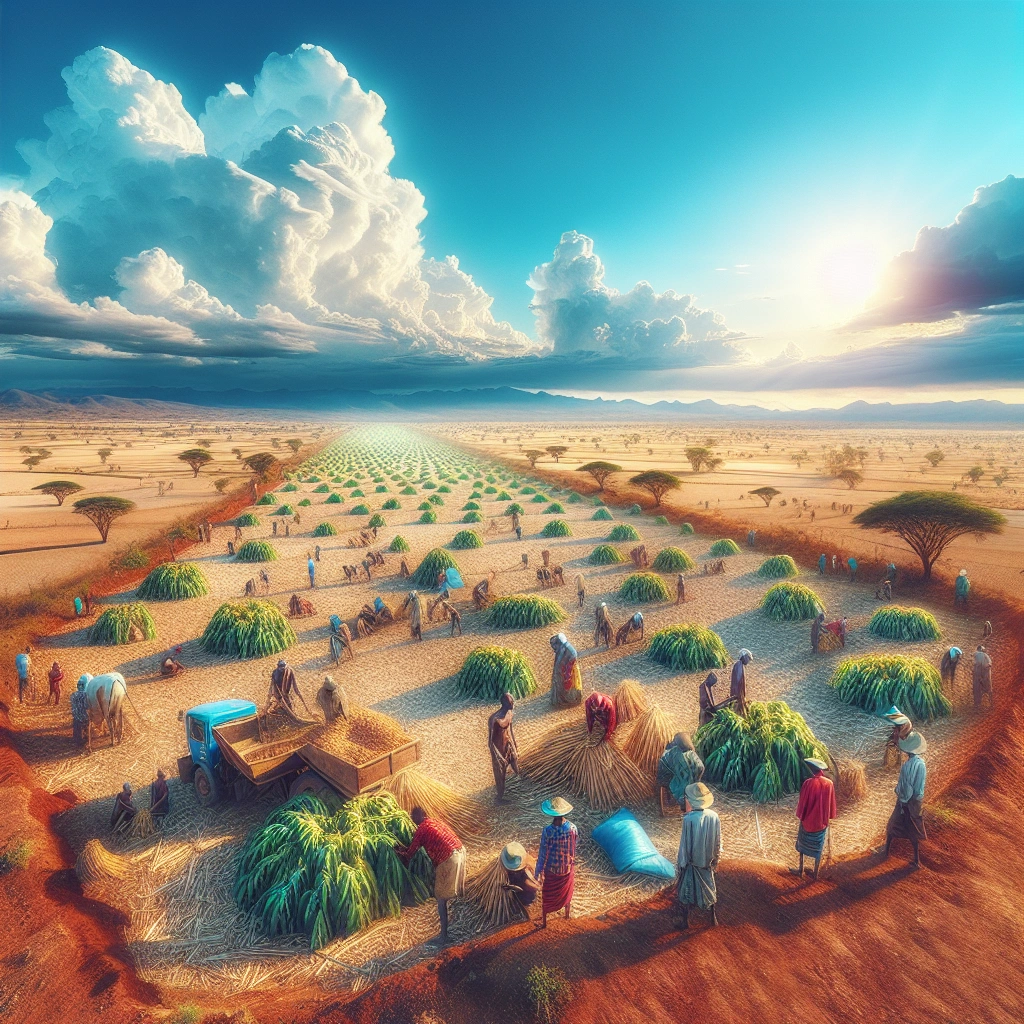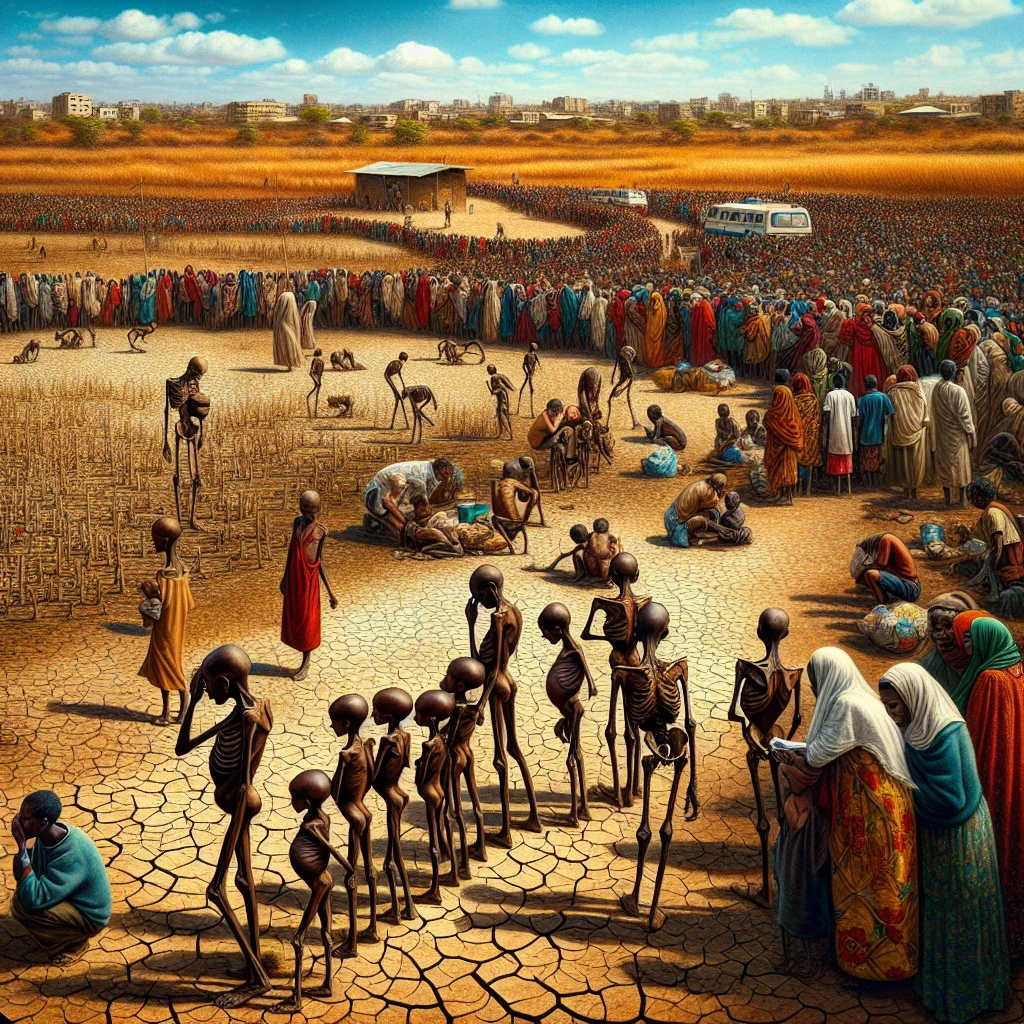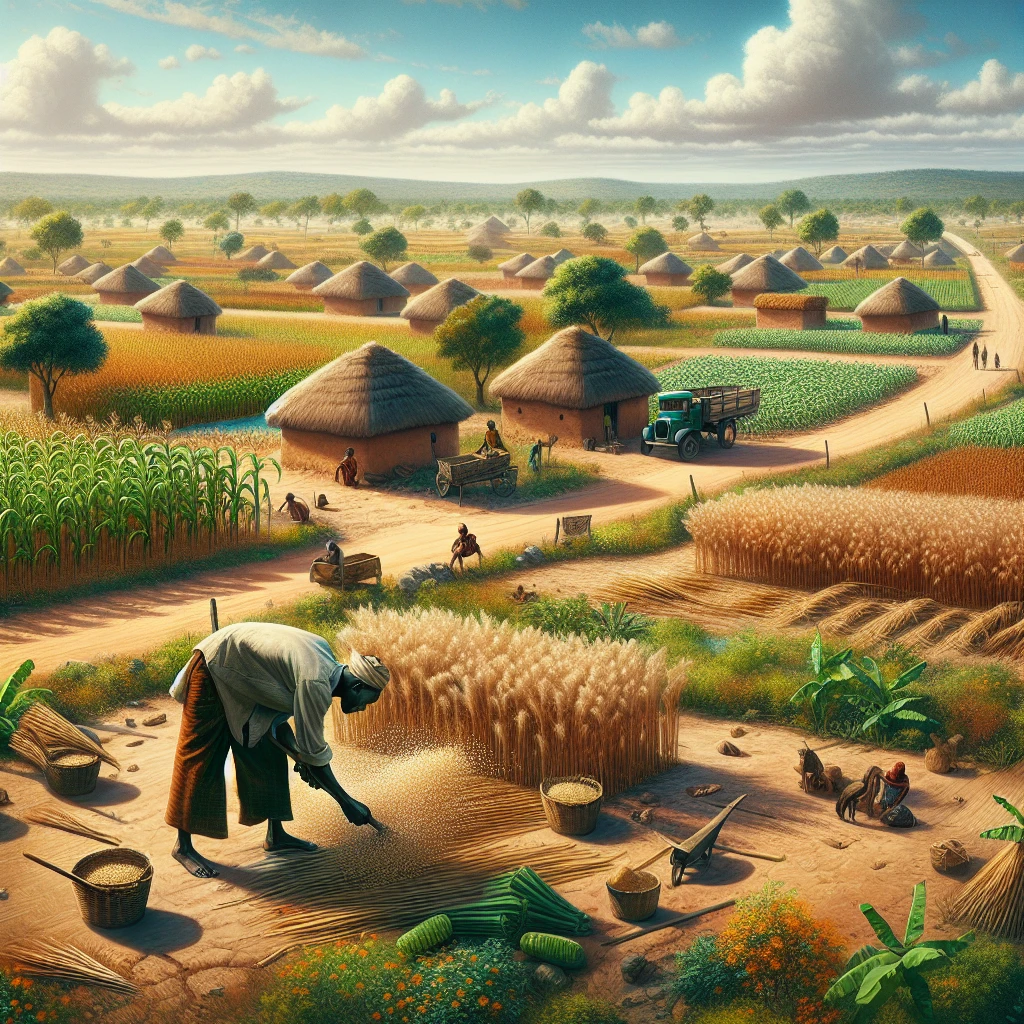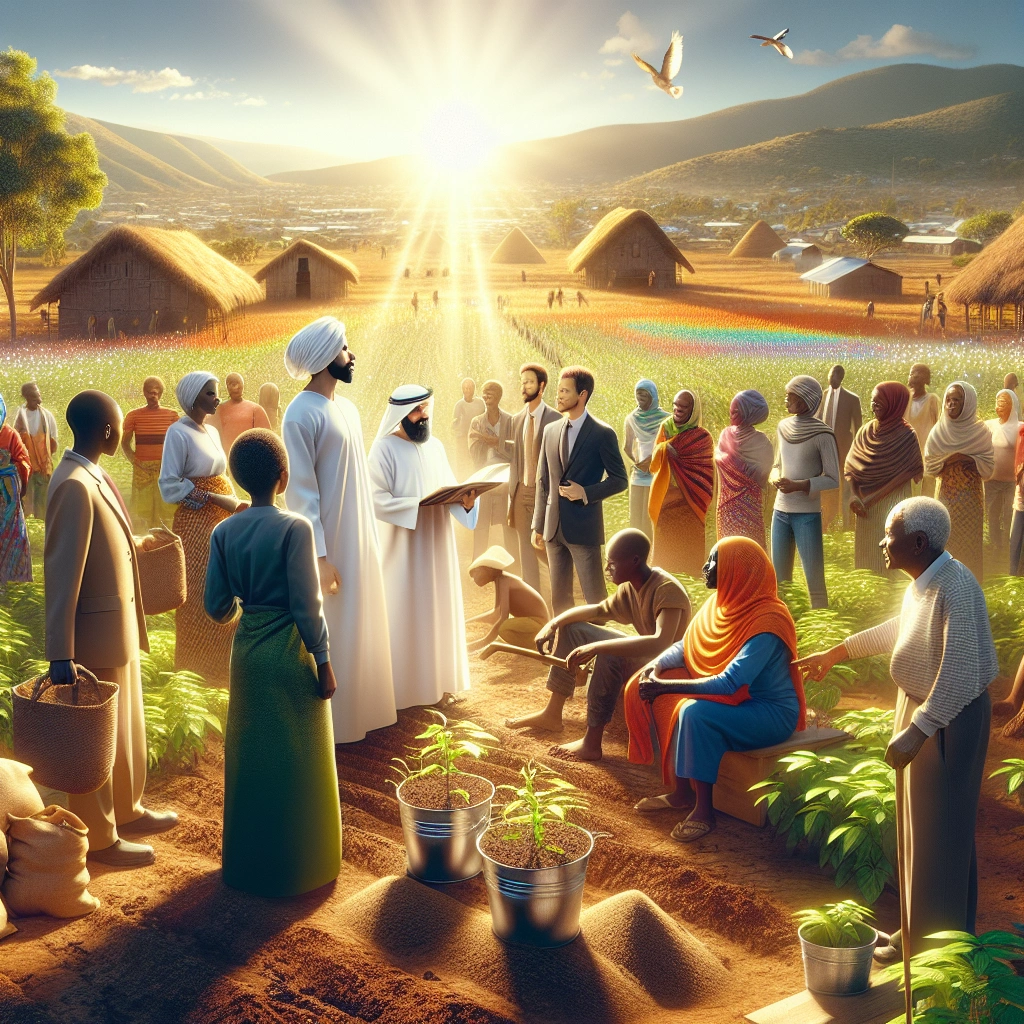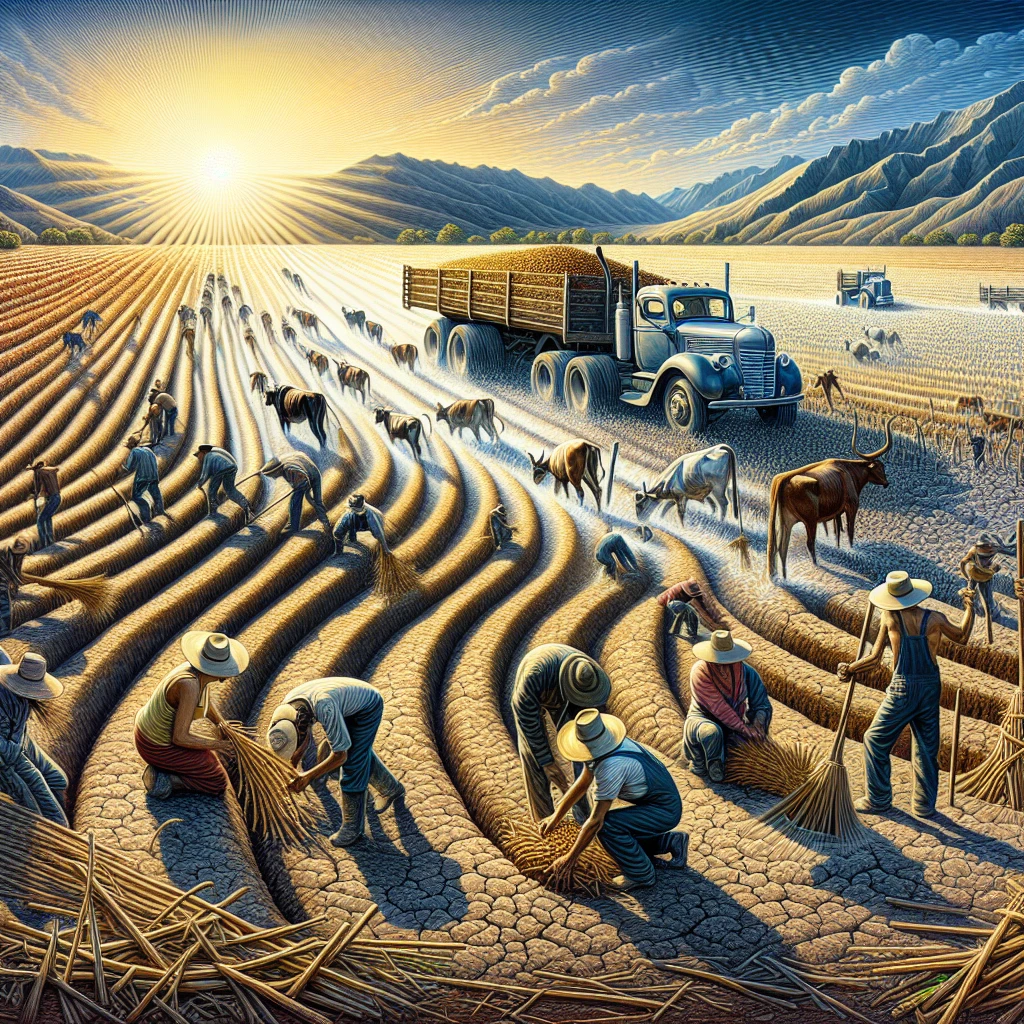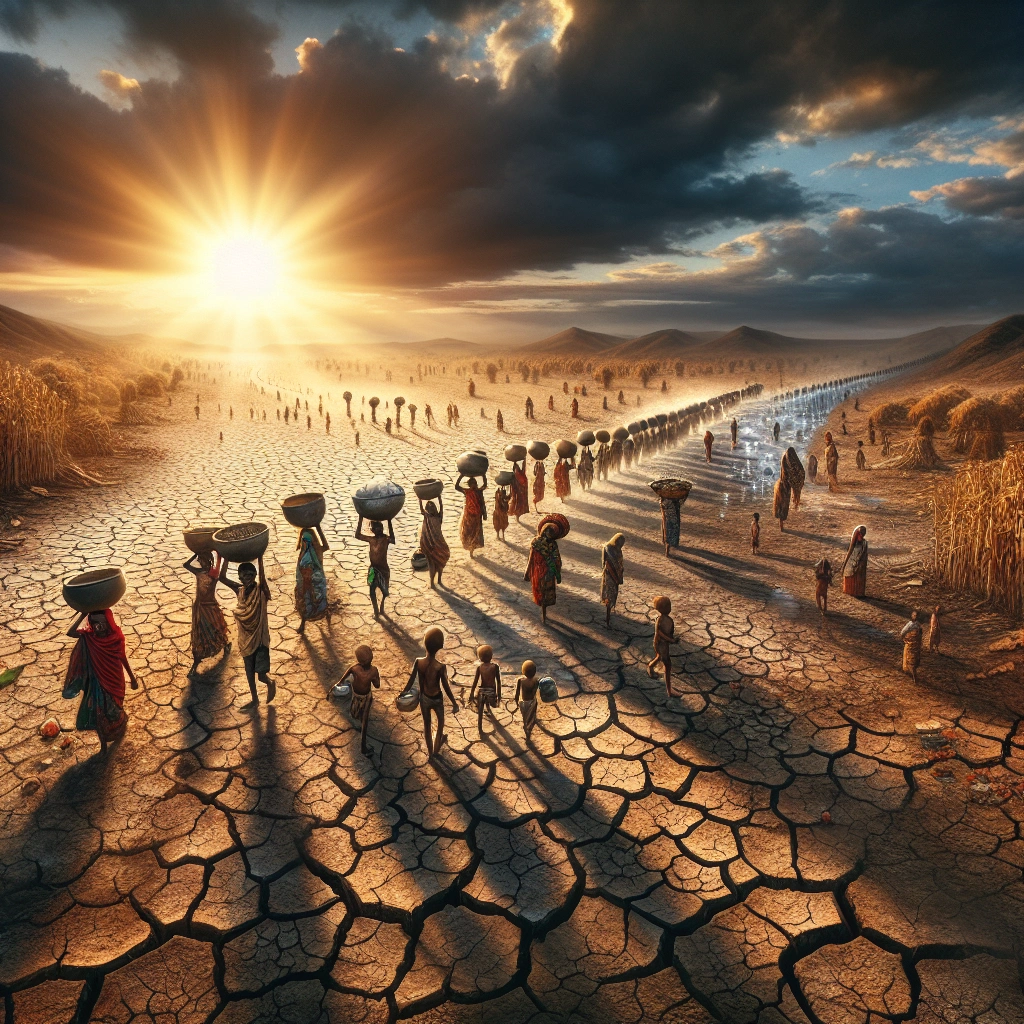

Food shortage in Africa refers to the insufficient availability and access to food in the region, leading to widespread hunger and malnutrition. The severity of food shortage in Africa is exacerbated by factors such as recurring droughts, climate change, conflicts, and rising food prices, which have a significant impact on the population.
Recurring drought, climate change, and environmental degradation have led to crop failures, impacting agricultural production and food availability in Africa. Rising food prices and speculation worldwide have contributed to the severity of food shortage in the region, making it difficult for people to afford essential food items.
Humanitarian crises resulting from armed conflicts in countries like northern Mali, northern Nigeria, and South Sudan have also worsened food shortages in Africa, leading to widespread hunger and malnutrition.
Check out this Youtube video: “Africa: 346 million facing food insecurity; hunger crisis surge …” to learn about the causes of food shortage in Africa and how it is impacting millions of people.
Climate Change and Environmental Factors
Drought and unreliable rainfall
Drought and unreliable rainfall in Africa contribute significantly to food shortage. With irregular precipitation patterns and prolonged dry seasons, agricultural activities are severely impacted, leading to crop failures and reduced food production.
For example, prolonged drought in the Horn of Africa in 2011 resulted in a severe food crisis, affecting millions of people.
Land degradation and desertification
Land degradation and desertification worsen the food shortage in Africa by diminishing arable land and reducing its productivity. Unsustainable farming practices, overgrazing, and deforestation accelerate the process, leading to loss of fertile soil and decreased agricultural yields.
As a result, communities reliant on agriculture face food insecurity and struggle to sustain themselves.
Deforestation and loss of arable land
Deforestation is a significant factor contributing to the food shortage in Africa. The clearing of forests for agriculture and other purposes leads to the loss of crucial habitats and disrupts ecological balance.
In addition, it causes soil erosion, reduces water retention capacity, and affects the overall ecosystem, impacting food production and availability.
Conflict and Political Instability
Civil wars and internal conflicts
Civil wars and internal conflicts in Africa have devastating effects on food security. These conflicts disrupt agricultural activities, causing damage to farms, livestock, and infrastructure.
As a result, farmers are unable to cultivate crops, leading to reduced food production. The displacement of people during these conflicts further exacerbates the situation, as it causes a shift in labor from agricultural work to seeking safety and shelter.
Corruption and mismanagement of food resources
Corruption and mismanagement of food resources within governmental systems contribute significantly to food shortages in Africa. When officials engage in corrupt practices, it disrupts the distribution of food aid and resources to those in need.
Additionally, funds that are meant for agricultural development and food security initiatives often end up in the wrong hands, hindering the improvement of food production and distribution systems.
Displacement of populations due to conflict
The displacement of populations due to conflict creates a ripple effect on food security. Displaced individuals often lose access to their sources of livelihood and are forced to rely on aid programs for sustenance.
This sudden surge in demand for food aid overwhelms existing support systems, leading to shortages and inadequate provision of essential nourishment to the affected populations.
| Example | Impact |
|---|---|
| South Sudan Conflict | The ongoing conflict in South Sudan has caused widespread displacement and hindered agricultural activities, leading to food scarcity and malnutrition. |
| Corruption in Food Aid | In countries like Nigeria, corrupt practices divert food aid from reaching vulnerable communities, exacerbating food shortages and malnutrition. |
| Refugee Crisis | Conflict-induced displacement in countries like Somalia and the Democratic Republic of the Congo has strained food resources, causing immense food insecurity for displaced populations. |
The combination of civil wars, corruption, and displacement in Africa perpetuates a cycle of food shortage and insecurity, affecting the lives of millions of people. It is crucial for governments and international organizations to address these root causes and work towards sustainable solutions for food security in conflict-affected regions.
Economic Challenges
Poverty and lack of investment in agriculture
The high levels of poverty in Africa contribute to the lack of investment in agriculture. Many people in the region struggle with extreme poverty, making it difficult to allocate resources for agricultural development and modern farming techniques.
This hinders the potential for increased food production and self-sustainability.
Inadequate infrastructure for food distribution
The inadequate infrastructure for food distribution in Africa presents a significant challenge. Poor road networks, limited storage facilities, and inefficient transportation systems result in significant food wastage and difficulties in getting food from production areas to the local markets.
This impacts the availability and accessibility of food for the population, exacerbating the food shortage crisis.
Dependency on imported food items due to low local production
Due to low local food production, many African countries heavily rely on imported food items to meet the nutritional needs of their populations. This dependency makes these nations vulnerable to fluctuating global food prices, supply chain disruptions, and trade restrictions, further exacerbating food shortages and insecurity.
Stimulating local food production is crucial to reducing reliance on imported items and addressing food shortages sustainably.
Population Growth and Urbanization
Rapid population growth
With over 50% of the world’s population currently residing in urban areas, the projected urban percentage is expected to reach 60% by the year 2030. This rapid population growth is influencing a significant shift towards urbanization, posing challenges in meeting the associated increasing demand for food.
Urban migration and concentration of population
Urban migration, fueled by pull factors such as improved job opportunities, better access to education, and higher living standards, has been a key contributor to the concentration of population in urban areas. This mass urbanization has led to a substantial shift in spatial population patterns, impacting infrastructure and resource allocation.
Increased demand for food in urban areas
The urbanization trend is giving rise to an increased demand for food in urban areas. The growing cities are witnessing a surge in demand for agricultural products, driven not only by the increased urban populations but also by changes in dietary patterns.
This shift is exerting pressure on food production systems, necessitating innovative approaches to ensure food security in urban settings.
| Causes of Food Shortage in Africa |
|---|
| 1. Rapid population growth contributing to urbanization |
| 2. Urban migration leading to concentration of population |
| 3. Increased demand for food in urban areas due to shifts in dietary patterns and population growth |
Lack of Agricultural Innovations
Limited access to modern farming techniques
The lack of access to modern farming techniques in Africa greatly contributes to the food shortage in the region. Many small-scale farmers and communities in Africa still rely on traditional, inefficient farming methods, resulting in lower crop yields and food scarcity. Without access to modern technologies like precision agriculture, regenerative farming, and data-powered decision-making, farmers struggle to increase productivity and sustainability to meet the growing demand for food.
Insufficient investment in agricultural research and development
Insufficient investment in agricultural research and development exacerbates the food shortage in Africa. The lack of funding and support for innovative farming practices and technologies hinders the progress of agricultural advancements. With adequate investment, farmers could benefit from precision agriculture, indoor vertical farming, and emerging livestock technologies, which would significantly improve productivity and agricultural output.
Inadequate government support for small-scale farmers
Inadequate government support for small-scale farmers further intensifies the food shortage in Africa. Many small-scale farmers lack access to funding, resources, and training programs provided by the government, inhibiting their ability to adopt modern farming techniques and improve their agricultural practices. With more substantial support from the government, including financial aid, technical training, and access to agricultural resources, small-scale farmers could enhance their productivity and contribute to alleviating the food shortage.
| Limited access to modern farming techniques | Insufficient investment in agricultural research and development | Inadequate government support for small-scale farmers |
|---|---|---|
| Reliance on traditional methods | Lack of funding for innovative practices | Lack of financial aid and resources |
| Hindered productivity and sustainability | Missed opportunities for advancements | Inhibited adoption of modern techniques |
| Struggle to meet food demand | Impact on agricultural output | Hindered progress of small-scale farming |
Gender Inequality
Limited access to land and resources for women
Limited access to land and resources for women in Africa significantly contributes to the food shortage on the continent. With less than 20 percent of the world’s landholders being women, and sub-Saharan women collectively spending about 40 billion hours a year collecting water, the unequal land distribution and resource access hinder women’s ability to engage in productive agricultural activities.
This limitation directly impacts food production and availability, exacerbating the food shortage in Africa.
Gender-based discrimination in agricultural sector
Gender-based discrimination within the agricultural sector further compounds the issue of food shortage in Africa. Despite women making up about 43 percent of the agricultural labor force in developing countries, they face gender-specific obstacles such as lack of access to land, financing, markets, agricultural training and education, and suitable working conditions.
This discrimination hinders their productivity and overall contribution to food production, thereby exacerbating the crisis.
Impact of gender inequality on food production and distribution
The impact of gender inequality on food production and distribution in Africa cannot be overstated. The barriers women face, including limited access to land and resources, gender-based discrimination, and unequal treatment, result in reduced agricultural productivity.
As a result, women farmers are particularly at risk of food insecurity, especially in times of growing global hunger. Closing the gender gap in farm productivity and agricultural employment could significantly increase global gross domestic product and reduce food insecurity.
Addressing gender inequality in the agricultural sector is crucial to improving food production and distribution in Africa.
Inadequate Water Management
Water scarcity and inefficient irrigation systems
The scarcity of water in Africa is exacerbated by the inefficient use of water resources in agriculture. Inadequate irrigation systems, such as leaky channels and inefficient application methods, lead to significant water wastage, contributing to water scarcity and the inability to meet agricultural water demands.
For instance, in many areas, irrigation systems are outdated or poorly maintained, resulting in inefficient water distribution across farmlands.
Pollution of water sources
The pollution of water sources further compounds the issue of inadequate water management in Africa. Hazardous chemicals, pesticides, and herbicides from industries and agricultural activities contaminate water bodies, rendering them unsuitable for human consumption and agricultural purposes.
This pollution not only limits the availability of clean water for drinking and irrigation but also poses severe health risks to the communities relying on these water sources.
Impact of inadequate water management on agricultural productivity
Inadequate water management profoundly impacts agricultural productivity in Africa. When water resources are mismanaged, farmers face challenges in sustaining crop yields and livestock production. The lack of access to reliable water sources hinders agricultural activities, leading to reduced crop cultivation and livestock maintenance. This ultimately contributes to food shortages and exacerbates the already challenging situation of food insecurity in the region. Table illustrating the Impact of Inadequate Water Management
| Impact of Inadequate Water Management | Details |
|---|---|
| Reduced Crop Yields | Mismanagement of water hampers crop growth and reduces agricultural output. |
| Livestock Maintenance | Inadequate water sources limit the ability to care for livestock, affecting meat and dairy production. |
| Food Shortages | Insufficient water management exacerbates food shortages, leading to increased food insecurity in the region. |
External Influences and Market Access
Global trade policies and market volatility
The impact of global trade policies on market access and food shortage in Africa cannot be overlooked. Trade policy announcements have been shown to increase price volatility in the global food market.
For instance, export restrictions can lead to price rises, exacerbating global price volatility and threatening food security in the region. The announcement effects of trade policy changes have a direct influence on local markets, affecting the availability and affordability of essential food items.
Dependence on foreign aid and food donations
A critical aspect contributing to food shortage in Africa is the dependence on foreign aid and food donations. Aid dependency, involving the proportion of government spending that relies on foreign donors, plays a significant role.
While foreign aid can provide short-term relief, long-term dependence on it can hinder self-sufficiency and sustainable food production in the region. Countries like Ghana and Mozambique have seen a decrease in aid dependency, emphasizing the need for self-reliance and sustainable development.
Impact of international food prices on local markets
The impact of international food prices on local markets in Africa is profound. Elevated global food prices directly affect the affordability and accessibility of food in local markets.
Factors such as war, weather conditions, and material costs contribute to keeping food prices elevated, exacerbating the food shortage in the region. The transmission of price fluctuations from international food commodity markets to local consumers further adds to the challenges faced in maintaining food security.
| Countries | Aid Dependency |
|---|---|
| Ghana | 27% |
| Mozambique | 58% |
External influences such as global trade policies, foreign aid dependency, and international food price volatility significantly impact market access and contribute to the food shortage in Africa. It is imperative to address these influences through sustainable economic initiatives and policies that promote self-sufficiency and stability in the region’s food supply.
Health and Nutrition Challenges
Malnutrition and its impact on food security
Malnutrition in Africa is a major contributor to food shortages. The lack of access to nutrient-rich foods leads to stunted growth in children and chronic health issues in adults.
This impacts food security as malnourished individuals struggle to meet their nutritional needs, creating a cycle of inadequate food production and consumption.
Lack of access to healthcare and nutrition education
Limited access to healthcare and nutrition education exacerbates the food shortage crisis in Africa. Without proper medical care and education on healthy eating habits, individuals are more prone to malnutrition and its detrimental effects.
Addressing this lack of access is crucial to breaking the cycle of food insecurity.
Vulnerability of children and women to food shortages
Children and women are particularly vulnerable to food shortages in Africa. Malnutrition in pregnant women can lead to low birth weight and health complications for both the mother and the child.
Additionally, children rely on adequate nutrition for healthy growth and development, making them more susceptible to the impacts of food shortages.
| Causes of Food Shortage in Africa |
|---|
| Malnutrition |
| Limited Healthcare Access |
| Vulnerability of Children and Women |
Addressing malnutrition, improving healthcare access, and focusing on the needs of children and women are crucial steps in combating the causes of food shortage in Africa.
Infrastructure and Technology
Inadequate storage and transportation facilities
One of the major causes of food shortage in Africa is the inadequate storage and transportation facilities. Poor infrastructure and lack of proper storage facilities lead to significant post-harvest losses, estimated at 30-40% for grains and 40-50% for fruits and vegetables.
This limits the availability of food for consumption and distribution to remote regions, exacerbating the food shortage crisis.
Lack of access to modern agricultural equipment
The lack of access to modern agricultural equipment further contributes to the food shortage in Africa. Smallholder farmers, who make up the majority of the agricultural sector, often rely on traditional and manual farming methods due to the unavailability of modern machinery.
This inefficiency in farming practices hinders food production and limits the capacity to meet the growing demands of the population.
Need for investment in technology for improved food production and distribution
There is a pressing need for investment in technology to enhance food production and distribution in Africa. Advanced agricultural technologies such as precision farming, drone monitoring, and climate-resilient crops can significantly improve crop yields and mitigate the impact of environmental challenges.
Additionally, investments in efficient transportation systems and cold chain infrastructure are crucial for preserving food quality and reducing wastage during distribution.
| Challenges | Impact |
|---|---|
| Inadequate storage facilities | Post-harvest losses, limited food availability |
| Lack of modern agricultural equipment | Inefficient farming practices, reduced crop yields |
| Investment in technology | Enhanced food production, reduced wastage |
By addressing these technological challenges, Africa can move towards a more sustainable and resilient food production system, ultimately alleviating the prevailing food shortage crisis in the region.
Recommended Amazon Products for Food Shortage in Africa
Here’s a curated list of products that can help tackle the causes of food shortage in Africa. These recommendations are based on the specific challenges outlined such as climate change, conflict, economic challenges, population growth, lack of agricultural innovations, gender inequality, inadequate water management, external influences, health, and infrastructure & technology.
Solar Powered Water Pump


Pros
| Pros | Cons |
|---|---|
| Provides reliable water supply for irrigation | Installation may require technical expertise |
| Operates using renewable energy source | Initial cost may be high |
| Reduces dependence on rainfall | Maintenance and repairs could be costly |
Cons
A solar-powered water pump is an essential tool to combat drought and unreliable rainfall, as well as the inadequate water management contributing to food shortage in Africa. This product offers a sustainable solution by providing a reliable water supply for irrigation, reducing dependency on erratic rainfall and promoting agricultural productivity.
High-Yield Seeds Variety Pack


Pros
| Pros | Cons |
|---|---|
| Contains a variety of high-yield crop seeds | Quality of seeds may vary |
| Well-suited for various climates and growing conditions | Some seeds may require specific expertise |
| Promotes crop diversity and resilience | Availability may be limited |
Cons
A high-yield seeds variety pack can address the challenges of land degradation, urban migration, and low local production contributing to food shortage in Africa. This product offers the opportunity to diversify and enhance agricultural productivity, thereby contributing to improved food security and sustainability.
Portable Solar Generator


Pros
| Pros | Cons |
|---|---|
| Provides alternative power source for small-scale farms | Limited power capacity for larger operations |
| Easy to transport and set up | Initial cost may be a barrier for some farmers |
| Offers a clean and sustainable energy solution | May not be suitable for all agricultural equipment |
Cons
A portable solar generator is a versatile solution to address the economic challenges and lack of access to modern agricultural equipment in Africa. This product offers an alternative power source for small-scale farms, promoting productivity and reducing dependency on fossil fuels.
Women’s Land and Resource Rights Book


Pros
| Pros | Cons |
|---|---|
| Provides comprehensive information on gender rights in agriculture | Limited impact without policy and legal changes |
| Raises awareness on the importance of women’s access to land | May not directly address immediate food shortage |
| Encourages gender equality in agriculture | Availability may be limited |
Cons
Ensuring women’s access to land and resources is crucial to addressing gender inequality and promoting sustainable food production in Africa. This book provides essential knowledge and advocacy tools to empower women in agriculture, thereby contributing to improved food security and livelihoods.
Top Recommended Product for Addressing Food Shortage in Africa
If you’re looking for the best solution to combat food shortage in Africa, we highly recommend the Solar Powered Water Pump. This product offers a sustainable solution to tackle the challenges of drought, unreliable rainfall, and inadequate water management, contributing to improved agricultural productivity and food security in the region. Ready to make a positive impact on food shortage? Check out the Solar Powered Water Pump today for the best results!


The causes of food shortage in Africa are multifaceted. Conflict and political instability have disrupted agricultural production and distribution, leading to food scarcity in many regions.
In addition, extreme weather events such as droughts and floods have negatively impacted crop yields, further exacerbating the food shortages. Furthermore, poverty and lack of access to modern farming techniques and technologies have also contributed to the inadequate food supply in many African countries.
Moreover, the rapid population growth in Africa has put immense pressure on the already strained food resources, leading to shortages in many areas. Inadequate infrastructure, such as poor roads and storage facilities, has also led to significant food wastage and shortage.
Furthermore, limited access to clean water and sanitation has contributed to food insecurity, as it hinders proper hygiene and food safety practices.
Conclusion
Addressing the root causes of food shortage in Africa will require a holistic approach that addresses political stability, climate change mitigation, poverty alleviation, and improved agricultural infrastructure. Efforts to improve access to modern farming techniques, innovative irrigation methods, and sustainable agricultural practices will also be crucial in mitigating food shortages.
Additionally, investing in education and healthcare to address poverty and improve living standards will play a significant role in ensuring long-term food security in Africa.

